Saturday, November 16, 2024 05:46 PM
Release of 28 Afghan Prisoners from Pakistan
- 28 Afghan citizens released from Pakistani prisons.
- Eight minors received support from HARO organization.
- Urgent need for legal status of Afghan refugees.
 Image Credits: thefrontierpost
Image Credits: thefrontierpost28 Afghan citizens released from Pakistani prisons, highlighting urgent need for refugee legal status and support.
The situation of Afghan migrants in Pakistan has been a pressing issue, especially in light of recent developments. On October 7, 2023, the Torkham Border Authority in Nangarhar Province announced the release of 28 Afghan citizens who had been imprisoned in Pakistan. These individuals were detained primarily for not having the necessary legal documents, spending anywhere from 40 days to two months in custody.
The Torkham Border Authority confirmed that these freed prisoners were returned to Afghanistan through the Torkham border. Upon their return, they were referred to the International Organization for Migration (IOM) for assistance. Notably, among those released, eight individuals were under the age of 18 and have been introduced to the HARO organization for additional support.
This incident is not isolated; it reflects a broader trend where Afghan citizens in Pakistan have faced arrests and subsequent expulsions. Pakistani authorities have consistently stated that the main reason for these arrests is the lack of legal residency documents among Afghan migrants. The situation has become increasingly concerning, as the deportation of undocumented Afghan citizens has surged in countries like Pakistan, Iran, and Turkey.
The humanitarian challenges faced by these returning migrants cannot be overstated. Many of them are coming back to Afghanistan without the necessary resources or support systems in place. This ongoing crisis underscores the urgent need to address the legal status of Afghan refugees in neighboring countries. It is crucial to ensure that these individuals can return to their homeland safely and with dignity.
As the international community looks on, it is imperative for organizations to ramp up their efforts in providing assistance and protection to these vulnerable populations. The plight of Afghan migrants serves as a reminder of the importance of compassion and support in times of crisis. By addressing these issues, we can help pave the way for a more stable and secure future for all those affected.













